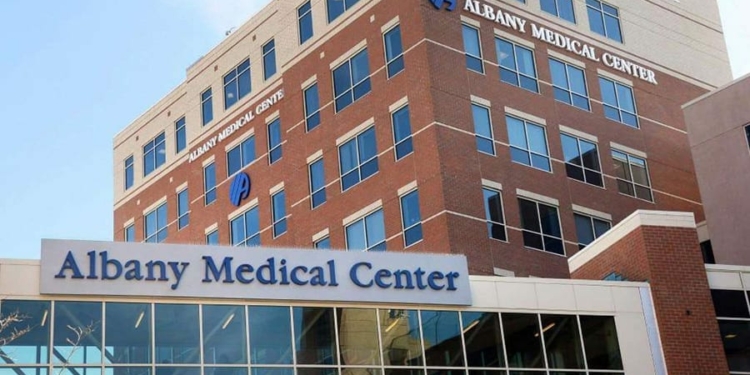ALBANY – Throughout the Albany Med Health System, geriatric medicine clinicians compassionately care for older patients, many of whom have complex medical needs that require the expertise of additional specialists from areas such as neurology, physical medicine and rehabilitation, and cardiology.
Likewise, in the research labs at Albany Medical College, a cross-departmental team of scientists is teaming up to tackle the prevalent diseases of aging.
As part of a new collaboration, Professors Margarida Barroso, PhD and Gabrielle Fredman, PhD in the Department of Molecular and Cellular Physiology (MCP), Professor Kate MacNamara, PhD in the Department of Immunology and Microbial Disease, and Associate Professor Kristen Zuloaga, PhD in the Department of Neuroscience and Experimental Therapeutics (DNET) are working together to better understand the disease processes related to aging, and to explore the links between aging and age-related diseases like cardiovascular disease and dementia.
“Our work unites cardiovascular, neurovascular, hematologic, and drug targeting fields,” said Dr. Fredman, whose own research focuses on atherosclerosis. “This collaboration allows us to expand the depth and scope of each of our programs to hopefully foster discoveries that deepen our understanding of each condition and illuminate shared mechanisms across these major health challenges.”
Atherosclerosis, also called hardening of the arteries, occurs when plaque builds up in the arteries, causing them to narrow over time and reducing blood flow to tissues and organs in the body. This can lead to a range of cardiovascular diseases, including heart attack and stroke, which collectively are the leading cause of death in the U.S. and worldwide.
Meanwhile, dementias, including Alzheimer’s disease, are a growing public health crisis, with 152 million people worldwide projected to be living with dementia by 2050.
With seed grant support from the chairs of MCP and DNET, one of the first projects the scientists are partnering on is a study of the relationship between atherosclerosis and dementia.
“Heart disease can exacerbate dementia and it’s known that atherosclerosis increases the risk of dementia by two and-a-half times,” said Dr. Zuloaga, a neuroscientist who studies Alzheimer’s disease and other dementias.
Drawing on the expertise of Drs. Fredman and Zuloaga, as well as Dr. MacNamara’s knowledge of immunology and how blood production changes during aging, and Dr. Barroso’s skills in advanced imaging techniques for measuring the efficacy of drug therapies, the researchers hope to uncover the mechanisms that link atherosclerosis
with cardiovascular disease-related cognitive decline.
“Each of our individual programs are strengthened by collaboration with the others,” said Dr. Fredman.
With their combined expertise and resources, the scientists are poised to broaden their investigations into the role of aging on disease and health, and to contribute more widely to the field of geroscience. “We hope to push the envelope toward safer medications and a better understanding of the aging process,” said Dr. Fredman. “Moving forward, we also hope this type of scientific collaboration will be the model, not an exception.



